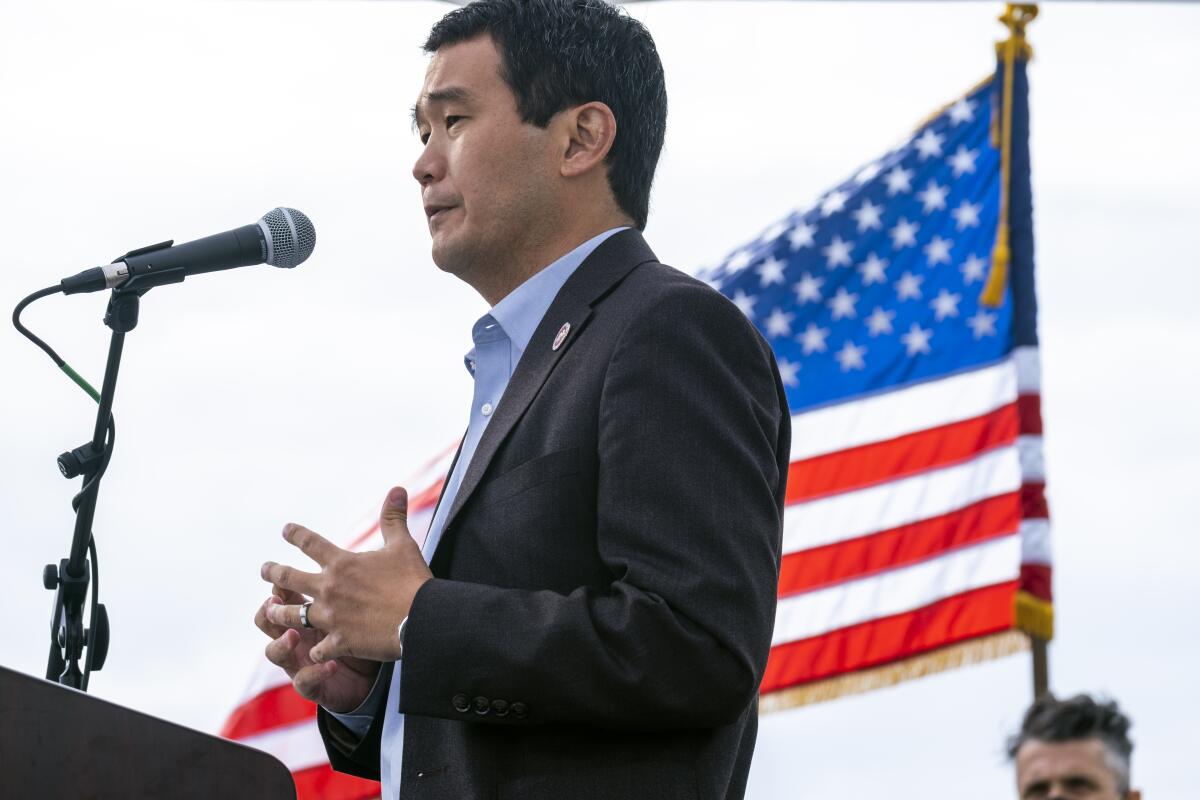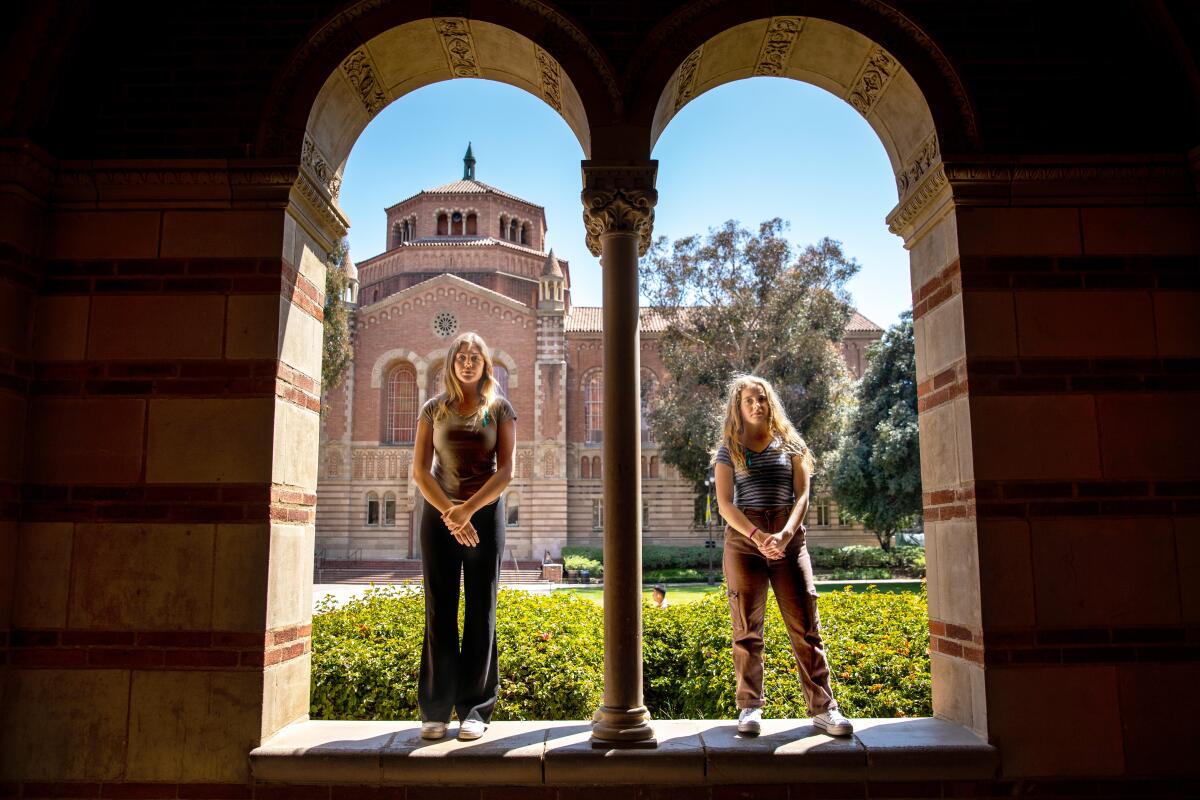California Politics: Will a Democrat’s drunk-driving arrest in Sacramento shape control of Congress?

- Share via
SACRAMENTO — When I started covering the state Capitol, lawmakers were getting popped for DUIs almost every year. Between 2010 and 2014, four state legislators faced charges of drunk driving, three of whom were arrested very close to the Capitol. Boozing it up at after-work cocktail parties or following late-night sessions under the dome was an obvious part of the culture for politicians in Sacramento.
Then things seemed to quiet down a bit. Maybe it had to do with the #MeToo movement that exposed pervasive sexual misconduct across society’s workplaces, including at the California Capitol. A handful of lawmakers resigned in the face of harassment allegations — some of which stemmed from after-hours work events — and lawmakers openly discussed the need to change the Capitol culture. That was followed by the COVID-19 pandemic, which further dampened the party vibe as the state imposed lockdowns and Democrats emphasized social distancing.
So the late-night arrest this week of state Sen. Dave Min (D-Irvine) felt like a bit of a throwback. It marked the first time in nearly nine years that the news media reported a California state lawmaker was accused of driving drunk in Sacramento. Records from the Sacramento County Sheriff’s Department show he was released from jail Wednesday morning, and Min posted this update on Facebook:
“Last night I was cited for a misdemeanor for driving under the influence. My decision to drive last night was irresponsible. I accept full responsibility and there is no excuse for my actions. To my family, constituents and supporters, I am so deeply sorry. I know I need to do better. I will not let this personal failure distract from our work in California and in Washington.”
Whether there will be significant political impacts from Min’s arrest remains to be seen. Democratic analyst Darry Sragow said he thinks voters won’t see it as a big deal because Min quickly acknowledged the mistake and apologized.
“Everything I know about the world of campaigns is that it’s not going to matter,” Sragow told me.
But the potential for a shake-up is enormous, and the political stakes are higher in a purple region like Orange County.
Min, a Democrat, is running for Congress next year in a competitive Orange County district that Republicans plan to spend heavily to flip. The seat is currently held by Rep. Katie Porter, a Democrat running for U.S. Senate. She narrowly won reelection last year against Republican Scott Baugh, who will be on the ballot again in 2024.
Democratic community organizer Joanna Weiss is also running, but Min had been seen as the strongest Democratic candidate. Democrat Harley Rouda, a former congressman from Laguna Beach, bowed out of the race last month to recover from a traumatic brain injury incurred in a fall.
Min’s arrest means that “Min’s chances just took a big hit, but not necessarily Democrats’ chances,” David Wasserman, a congressional forecaster for the nonpartisan Cook Political Report, told me.
“We won’t change our ‘Lean-D’ rating of the race based on this development.”
He pointed out that because the election is more than a year away, there is still time for Democrats to coalesce around Weiss and put up a strong fight to keep the seat.
The 47th congressional district — which includes Irvine, Huntington Beach, Costa Mesa, Newport Beach and Laguna Beach — is among a handful of swing districts in California that will help determine the balance of power in the narrowly-divided House of Representatives.
These seats are key to Democrats’ quest to reclaim control of the House, because they only need to flip five seats nationwide to win the majority. But that assumes they don’t lose any that they have now. And a Democrat’s drunk-driving arrest will be delicious fodder for Republican campaign ads.
Hours after news broke of Min’s arrest, the California Republican Party blasted out an email dubbing him “DUI Dave” and saying he had “put lives at risk when he made the reckless decision to drive drunk.”
It all adds up to this: What happens in Sacramento does not stay in Sacramento. In fact, it could wind up as a subplot in the very tight contest for control of Congress.
I’m Laurel Rosenhall, the Times’ Sacramento bureau chief, here with your guide to the week in California politics:
Few details on Feinstein’s condition

For years, Sen. Dianne Feinstein has swatted down growing concerns about her health, assuring constituents largely through statements to the press that she was still capable of serving. But with her prolonged absence from the Capitol this spring due to a case of shingles, pressure is building on the 89-year-old senator and her staff to provide additional details about her condition.
So far, they have not emerged.
With Democrats holding a bare-bones majority in the Senate, they need Feinstein’s vote to confirm judges, approve Biden Cabinet nominees and potentially avert a debt ceiling default. The predicament has put into stark relief the challenge of balancing a lawmaker’s privacy against the public’s right to know about the health of their representatives, write Times political reporters Melanie Mason and Benjamin Oreskes and Washington-based reporter Cameron Joseph.
This article is essential reading for Californians grappling with the limited amount of disclosure about Feinstein’s health status that has left her 39 million constituents in the dark: Despite renewed focus on Sen. Feinstein’s health, details of her condition are scarce
And here’s our other coverage this week of Feinstein and the 2024 race to succeed her:
- Why is it taking so long for Dianne Feinstein to recover from shingles?
- Feinstein has vowed to return to Washington, but what happens if she doesn’t?
- How Katie Porter’s book tour became part of her quasi-national Senate campaign
- Column: Is Biden too old to run again? Is Feinstein too frail to stay? It’s not about age
- Opinion: How to fill Dianne Feinstein’s seat if she resigns? The Constitution offers a clear answer
College students want on-campus rape care

Most colleges in California — and across the country — do not offer rape kits on campus, reports Times staff writer Mackenzie Mays. But sexual assaults are so common on college campuses that students are advocating for better access to care.
Prior attempts at state legislation to require forensic exams on college campuses have failed, but student advocacy groups aren’t giving up. They are lobbying politicians and putting pressure on university administrators to create more on-campus treatment for sexual violence, pointing to research that shows college students are both more likely to be sexually assaulted and less likely to report the assault to police.
“Sexual violence is everywhere on college campuses,” UCLA student Kate Rodgers said outside the Capitol on a recent trip to Sacramento to lobby for legislation that would require most colleges to provide free transportation to and from a sexual assault forensic exam.
“The current system places the burden of coordinating care on survivors in crisis.”
Read the full article here: Most California colleges don’t offer rape kits on campus. Students demand better access to care
Enjoying this newsletter? Consider subscribing to the Los Angeles Times
Your support helps us deliver the news that matters most. Become a subscriber.
Keeping up with California politics
Column: Want to stop California desertion? Lower housing costs — and taxes
Higher-income people are fleeing California to live in lower-tax states. For years, we denied that. Maybe it wasn’t even happening. But it definitely is now, writes columnist George Skelton. It’s logical given our high taxes, high housing costs and high costs of living, period. And there’s new evidence of it.
NFL under investigation in California, New York for race and gender discrimination
California and New York attorneys general are investigating the National Football League, focusing on claims of workplace discrimination and a hostile environment more than a year after dozens of female former employees disclosed negative experiences working within the organization.
Public tirades, recall threats as Shasta County roils from decision to dump voting machines
Weeks after deciding to dump Dominion Voting Systems and become the largest government entity in the U.S. to hand-count its votes, Shasta County officials are now grappling with the complex logistics of actually carrying out that approach, accurately and legally, in a county of 200,000 people.
Tribe signs pact with California to work together on efforts to save endangered salmon
A California tribe has signed agreements with state and federal agencies to work together on efforts to return endangered Chinook salmon to their traditional spawning areas upstream of Shasta Dam.
California air regulators approve landmark zero-emission rules for trucks and locomotives
California air regulators have adopted two landmark rules setting aggressive zero-emission requirements for fleets of heavier vehicles and locomotives, a move expected to drastically cut pollution near ports and rail yards and alter the way goods move through the American West.
LA Times Today: Newsom wants to extend Hollywood tax credits — and give out millions in refunds
Lawmakers are reviewing a proposal by Gov. Gavin Newsom to extend California’s film tax credit for another five years, allowing TV and film studios to convert a portion of their tax credits into cash payments. I explained the politics at play in this interview with the “L.A. Times Today” show on Spectrum News 1.
Editorial: The new anti-trash mantra should be reduce, recycle — and repair
California could become the second state to pass a law aimed at making it easier to repair electronic devices if the Legislature approves Senate Bill 244, writes The Times’ editorial board: “That is, if it gets through its next hurdle in the Senate Appropriations Committee, where two right-to-repair bills have stalled in the last two years without explanation from its chairman, Sen. Anthony Portantino (D-Burbank).”
Punishment or prevention? California debates fentanyl crisis
At a special hearing focused on legislation to address the proliferation of fentanyl, the Assembly Public Safety Committee advanced four bills, including one that would increase penalties for dealers with at least one kilogram of fentanyl products. The committee also voted down two bills that would lengthen prison sentences for fentanyl-related crimes.
Column: Tucker Carlson’s ludicrous falsehoods have no place in journalism
Times columnist George Skelton delivers some interesting history about Tucker Carlson’s father, who got his start as a news reporter in California and was sued over an article he wrote in 1969 that a judge found contained “false and defamatory” allegations that were made “with reckless disregard for their truth.”
California bill would boost teacher salaries by 50% over 7 years
Teachers unions are pushing for the bill to give them a raise, but the state is facing a projected $22.5-billion budget deficit.
Opinion: California wants more psychiatric detentions. That’s unlikely to improve anyone’s mental health
A mental health bill backed by some urban mayors would make it easier to forcibly treat more people. It comes on the heels of CARE Court, a program rolling out this year that broadened state powers to impose psychiatric care, writes author Rob Wipond.
Stay in touch
Did someone forward you this? Sign up here to get California Politics in your inbox.
Until next time, send your comments, suggestions and news tips to capolitics@latimes.com.
Sign up for Essential California
The most important California stories and recommendations in your inbox every morning.
You may occasionally receive promotional content from the Los Angeles Times.







